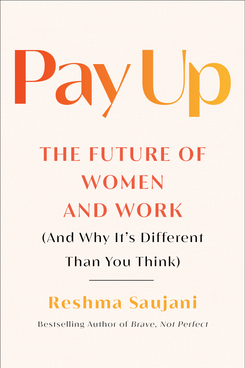
I’ve been branded “ambitious” my entire life. Though it was rarely intended as a compliment, as the daughter of immigrants, I wore it as a badge of honor.
Ambition drove me to hit all the prescribed stepping stones. I earned straight A’s, racked up degrees (and debt) from Harvard and Yale, and landed a job at a prestigious law firm. In my early career as an attorney, propelled by the #girlboss ethos, I climbed the corporate ladder by taking cues from my older male colleagues, the ones whose successes I envied. I kept my personal life discreetly tucked away, projecting constant availability, unwavering dedication and a laser-like focus on achievement.
I believed that if I just followed this playbook, I could attain that shimmering feminist promise of “having it all.” I was wrong.
I bought hook, line, and sinker into “The Big Lie,” which boils down to this: It makes no difference how much we lean into our careers or “whether we partner up with “one of the good ones,” because we participate in a workforce and live in a society that do not make “having it all” actually possible.
In the last two years, millions of women have come face to face with their own version of that lie as it’s unfolded in their own households. With a lack of affordable childcare and soaring rates of burnout and anxiety, one in three women today is considering quitting her job or “downshifting” in her career. “Having it all” has amounted to nothing more than a euphemism for “doing it all” – and it’s destroying our careers and our mental health.
But what if, instead of trying to fix ourselves with more leadership advice about self care and negotiating strategies, we asked our workplaces to step up?
What do employers have to do with perpetuating gendered dynamics in the home? Far more than you might think.
Less than half of all companies offer paid paternity leave, likely due in no small part to the societal expectation of who should be caring for newborns and the value—or, more accurately, non-value—we place on work in the home. Kudos to the companies like Netflix, Microsoft, Walmart, eBay, and Deloitte who are leading the charge on gender neutral parental leave, as well as the companies who are offering “parental bonding leave” and “secondary caregiver leave” for LGBTQ and adoptive parents. This is a good start, but to truly change the tide and make a powerful statement about the value of home labor and caregiving, companies need to go beyond offering paid parental leave. They need to build a culture that encourages dads to take it without professional consequences.
This has two layers. First, it means eradicating the outdated, macho-bullshit propagated by leaders like Joe Lonsdale, cofounder of Palantir Technologies Inc., who tweeted in response to U.S. Transportation Secretary Pete Buttigieg taking time off to care for his newborn that men who take family leave are “losers.” Lonsdale isn’t alone in this. When New York Mets second baseman Daniel Murphy missed opening day in 2014 because he was on paternity leave, radio host Mike Francesa chided, “You’re a major league baseball player—you can hire a nurse to take care of the baby if your wife needs help.”
Second, it means incentivizing, even mandating, family leave for new fathers and partners of birthing mothers and tying performance reviews, pay, and promotion considerations to it. The U.S. Department of Labor states that the vast majority of fathers take some time off after their children are born, but the majority of them take less than ten days away from the job. It’s not hard to connect the dots to ascertain why. If you are a company that touts that you offer a generous paid leave policy, unless you also show that the men at your firm take full advantage of the policy, you don’t get bragging rights.
The benefits of nurturing a company culture that encourages family leave are compelling. Research shows that family leave produces happier, more productive working dads. A McKinsey study reported that fathers who took paid leave feel more motivated and remain more committed to their employers, which we can deduce leads to less turnover. They also became more productive and prioritized their time better— again, better work practices lead to better bottom lines.
Paid gender-neutral leave allows for a more even distribution of the “invisible labor” of raising children and running a household; this leveling of the playing field can in turn help women remain in the workforce and reverse the alarming trend triggered by the pandemic. Indeed, women whose partners took paternity leave make more money in the long run. A study out of Sweden showed that a woman’s income rose 6.7 percent for every month that her partner took leave.
There are also downstream benefits of men taking parental leave that help reshape the dynamics at home. When we as a culture normalize gender neutral parental leave as opposed to just maternity leave, we begin to make the tectonic shift in how we value caregiving. A McKinsey & Company report released in March 2021 reported on the positive impact paternity leave (and, more crucially, fathers’ shared involvement in the first few months of a child’s life) has on families, which includes strengthening partnerships and forging lifelong bonds with children, mitigating postpartum depression in mothers, and setting a foundation for an equal and fair distribution of household responsibilities.
For decades, we have been telling women that their ambition would be the key to their happiness. We have encouraged women to get ahead at work by hiding who they are at home, keeping our roles as mothers and caregivers out of view. It’s time to channel our ambition towards a different future of work – one where workplaces don’t just accommodate what happens at home, but through policy and practice, actually begin to value it.
Excerpted from Pay Up, published by One Signal–Atria Books, a division of Simon & Schuster, Inc. Copyright © 2022 by Reshma Saujani.





